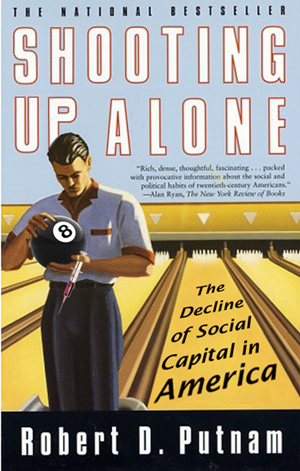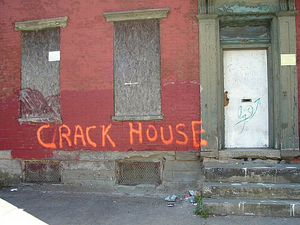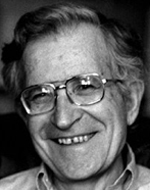| ||||||||||||||||||||||||||||||
| DOMESTIC POLITICS | RELATED ARTICLES | |||||||||||||||||||||||||||||
|
Pundits Decry Decline of Communal Drug Use in America
"America's social fabric is even more frayed than I realized — it's not just that Americans are quitting bowling leagues, joining the Rotary club less, and hosting fewer community barbecues. Americans are also making less time to smoke a bowl with their neighbors, or to snort a line of cocaine with casual acquaintances. And that's undermining the networks of mutual trust that bind America together — our nation's social capital." Putnam's unique dataset tracks drug-based social capital from 1970 to 2006. During that period, communal drug use has plummeted while individual drug use has stayed constant. "In the Golden Age of American civic life, young people would pass a joint around for hours, creating lasting ties of reciprocity," explains Putnam. "But now young people smoke a furtive joint alone, passed out in front of the TV. That may numb the pain of getting laid off at Lehman Brothers, but it doesn't lead to broader participation." As evidence, Putnam shows that marijuana use was closely correlated with social movement participation in the early 1970s, "but now smoking pot is only correlated with modest weight gain and lower grades."
Younger Americans are dramatically more individualistic, which has spilled into their recreational drug use and civic participation. Even sexual experimentation is less civic-minded, as college students increasingly stay in on Friday nights to use pornography instead of venturing out to wild, sexually promiscuous frat parties. Critics of this hypothesis argue that Putnam is simply focusing on the wrong drugs. Political scientist Eli T. Duschebagge posits that modern drugs like crack-cocaine, crystal meth, and ecstasy have created new communal drug scenes that do not appear in Putnam's dataset. "I can testify from experience that dropping 'E' creates some serious bonding in groups...if you know what I'm sayin'," said Professor Duschebagge, wiggling his bushy eyebrows suggestively. Putnam defends his empirical claims: "My data shows that crack houses across the country are empty. In the 1980s, these crack houses provided much-needed economic development and brought the generations together in abandoned inner-city neighborhoods. But now, younger generations prefer to smoke crack alone or with close friends, which isolates them from public life. It's time for Americans to turn off the T.V. set, get out of the house, and rebuild America's social capital around the crack pipe." Sociologist Jason Kaufman warns that there's a dark side to drug-based social capital in his book "For the Common Good? Drug Cartels and American Civic Life."
"Everyone assumes that more community drug use is a silver bullet for all our nation's problems. Historically, crack houses created strong bonding within local groups, but they also tore apart families and fostered deadly turf warfare between street gangs. We can't look to the neighborhood drug dealer to create the kind of outward-looking trust and tolerance that democracy requires." Professor Theda Skocpol agrees, "It's misguided to think that smoking crack together can renew our nation's civic life. Yes, it does create an intense feeling of power, but not the kind of power that allows us to address our nation's growing inequality. Let's get real here — do we really need more Wall Street elites snorting cocaine with the federal regulators who are supposed to keep them from exploiting ordinary Americans? Those predatory lenders were using drugs in their 'local communities' too — and between bong hits, they were figuring out how to steal your grandma's retirement savings." Skocpol added, "If you want to protect your grannie from amoral, coked-out, mortgage hustlers, then don't waste your time getting high at the park with your whining hipster friends. Instead, we need to reinvent federated civic organizations for the 21st century, so that Americans are once again smoking doobies across class lines to serve the common good." HSP
|
SPONSORED LINKS
SPONSORED LINKS
SPONSORED LINKS | |||||||||||||||||||||||||||||
| ||||||||||||||||||||||||||||||
| The Harvard Satyrical Press is not intended for readers under 18 years of age (Disclaimer) | (c) Copyright 2026, The Harvard Satyrical Press, Some Rights Reserved | |||||||||||||||||||||||||||||






 FACEBOOK
FACEBOOK REDDIT
REDDIT STUMBLEUPON
STUMBLEUPON DEL.ICIO.US
DEL.ICIO.US













